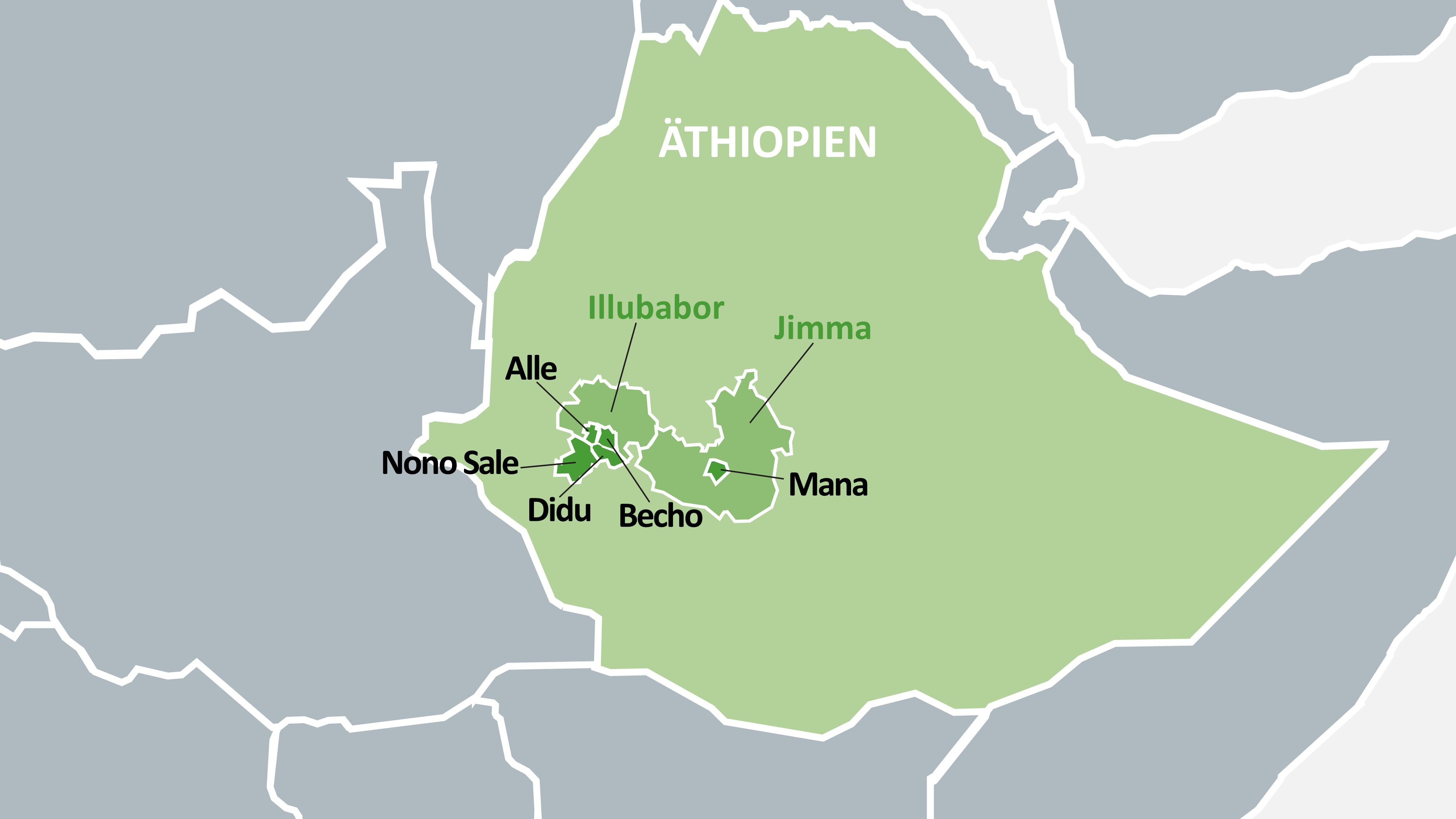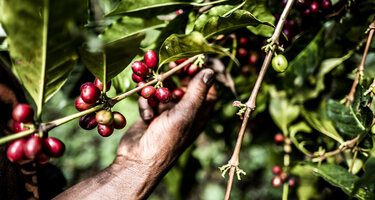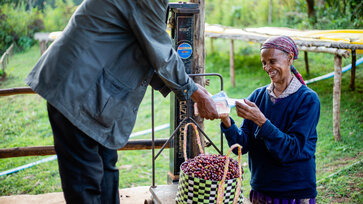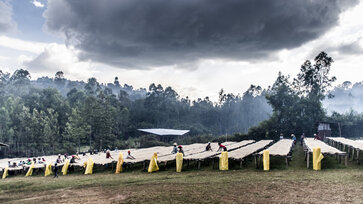Sustainability and Value Added in Agricultural Supply Chains in Ethiopia (SUVASE)
In the birthplace of coffee arabica in Western Ethiopia, SUVASE aims to improve the livelihoods of smallholder farmers and protect the unique environment.
The project at glance
Project goals
The project aims to strengthen the sustainability, inclusivity, and competitiveness of Ethiopia’s coffee sector through an integrated, multi-level approach that promotes resilience at the macro, meso, and micro levels. By enhancing productivity and quality, linking producers to international markets, and supporting compliance with EU regulatory requirements, the initiative seeks to preserve Ethiopia’s unique coffee production systems while ensuring long-term market access, improved livelihoods, socio-environmental benefits, and gender equity.
Project implementation
Background and challenges
Ethiopia earns about 30 % of its export revenue from coffee and nearly 4.7 million smallholders depend on it. They mainly grow coffee in shaded garden, semi‑forest and forest systems with minimal chemical inputs, which preserves biodiversity and makes Ethiopian coffee unique globally.
However, yields remain low due to poor pruning, low‑quality seedlings and limited technical support. Many farmers earn insufficient income. Without better returns, they may switch to more intensive methods, threatening ecosystems.
Women supply about 70 % of the labour but often lack training, resources and decision‑making power. The sector also has a prevalance for child labour and poor labour conditions.
EU’s Deforestation‑free Regulation (EUDR), Germany’s Supply Chain Due Diligence Act (LkSG) and the EU Corporate Due Diligence Directive (CSDDD) require companies to manage rights and environmental risks across supply chains. The coffee sector needs targeted support to comply and to safeguard livelihoods, women’s empowerment and ecosystems

Project intervention area
Our Approach
The “Sustainability and Value Added in Agricultural Supply Chains in Ethiopia (SUVASE)” project aims to improve the sustainability in the Ethiopian coffee value chain. It supports 42 cooperatives (9,000+ members) and 2,000 out‑growers in Jimma and Illubabor zones (Oromia region).
Economic dimension - Coffee productivity and quality improvement
By partnering with regional governmental institutions, private sector and research institutes we provide capacity building on agronomy, harvest and post harvest management. We introduce innovative approaches and technologies to improve productivity and quality at the farmers level and thereby sustainably secure farmers livelihoods through income increase in the Oromia region (Jimma and Illubabor Zone) of Ethiopia. We support the regulatory alignment for EU Market Access in close collaboration with ECTA and enhance traceability by helping establish a national system that captures geolocation data and enables end-to-end tracking of Ethiopian coffee.
Ecological dimension - Environmental protection and deforestation prevention
We promote sustainable farming practices and certification to secure income and environmental protection. By strengthening forest coffee systems, we are helping communities manage forests and monitor their ecological value.
Social dimension - Compliance with social standards and support of marginalized groups
We increase women’s involvement in training and decision‑making and develop income initiatives for people with special needs. Through partnerships with civil society organisations we embed gender‑transformative extension services and child‑labour prevention at policy level and raise awareness on child labour prevention. We introduce new technologies to improve productivity and quality at the farm level and increase farmers’ incomes.
Project partners
To ensure sustainable, long-term impact in Ethiopia’s coffee sector, GIZ implements activities along the entire supply chain by leveraging both public and private sector structures. The implementation is based on a proven mix of instruments. A key strategy is the promotion of Public-Private Partnerships (PPPs) through GIZ instruments such as develoPPP and Integrated Development Partnerships, as well as targeted collaboration with international and local NGOs with strong sectoral experience.
Our political partner the Ethiopian Coffee and Tea Authority (ECTA) coordinates the strategic alignment of Ethiopia’s coffee sector in general as well as all EUDR-related activities. Hance a close coordination as well as support of the existing structures is a corner stone of the project implementation.
What has been achieved so far?
The project adopts a multi-level gender-transformative approach to improve women’s access to agricultural extension services. Women’s training participation rose from 17% to 24% through the implementation of the family approach for selected trainings, and 60 women completed leadership training. A “gender competition” inspired development agents to raise awareness and reach more women through the agricultural extension service system. We developed a gender-transformative policy narrative to embed equality in extension systems and promote long-term structural and systemic change.
GIZ supported the development of Ethiopia’s national coffee traceability system which is crucial for regulatory compliance and market transparency.
A phased approach included:
- Market Information Management System (MIMS) development: Tracing coffee from local warehouses to export points, linking key agencies.
- Data collection: Collecting farm-level geolocation data with cooperatives.
- MIMS system upgrade: Adding geo-spatial data for EU compliance, forest mapping, and real-time farm data.
In the future the system will ensure full traceability and market access.
From quality to export, the project addressed challenges of inconsistent quality and limited infrastructure that previously hindered farmers’ access to international markets: We trained over 700 farmers and service providers in harvest and post-harvest handling techniques. More than 1,200 farmers adopted better drying beds, while 12 cooperatives constructed modern warehouses and introduced advanced drying technologies. These efforts enhanced coffee quality and consistency to meet global standards. We connected local exporters with international buyers. The business relations between Sorgeba Union and Union Hand‑Roasted is continuing into its third year.

Coffee quality affects women. Access to training for those who do the work is critical; usually our husbands get invited.


